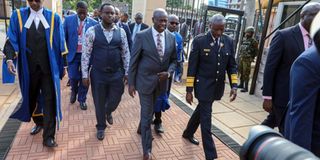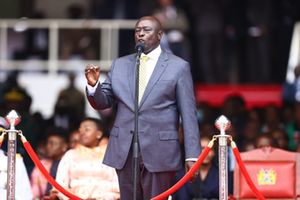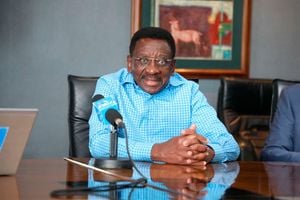
Deputy President Rigathi Gachagua arrives at the Senate for the second day of his impeachment trial.
Deputy President Rigathi Gachagua's lawyers tore into the testimony of prosecution witnesses as they sought to discredit the charges against him as false, ridiculous and embarrassing.
Kibwezi West MP Mwengi Mutuse and former Kenya Medical Supplies Authority (KEMSA) chief executive Andrew Mulwa had a tough time with the DP's lawyers, who poked holes in their testimony.
Mr Mutuse, who sponsored the impeachment motion passed by the National Assembly that set up the Senate trial, was forced to admit that he had done nothing about numerous companies he linked to the deputy president and which he claimed were part of a money-laundering network.
The MP was also forced to admit that neither Mr Gachagua nor his children were listed as owners of the Vipingo Beach Resort, which the deputy president has claimed belongs to the estate of his late brother Nderitu Gachagua, despite Mutuse's claims that it was among the Sh5.2 billion properties dubiously acquired by the DP.
“We have no evidence against Spirit Way Limited,” Mr Mutuse responded as the names of the companies he had adversely mentioned in his impeachment motion was read out to him one by one.
"We have no quarrel with Forties Group Limited," he said, continuing as the list grew.
Pressed on the real motive for listing the companies when he had no incriminating evidence against them, the MP suggested that he was pre-empting the commission of a crime in the future.
“We listed the companies because they are associated with DP. They can potentially be used for purposes of corruption,” he said.
Mr Gachagua’s lawyer Elisha Ongoya accused Mr Mutuse of listing companies that he knew he had no evidence of their wrongdoing simply to “grab the headlines” and make “hue and cry” of DP’s wealth portfolio.
The MP was also forced to retract another allegation that Mr Gachagua had interfered in the management of a coffee cooperative in Mathira. "Can you confirm that you alleged that DP Gachagua influenced his family to take over a cooperative," Mr Ongoya asked the witness.
"Yes," Mr Mutuse replied, admitting that he had no evidence to support the allegation.
The MP was also cornered on a claim that the deputy president had not formally complained to the Judicial Service Commission (JSC) about a judge whom Mr Mutuse accused Mr Gachagua of intimidating.
"On Justice Esther Maina," Mr Ongoya said, "is it true that the DP did not lodge a complaint with the JSC? Do you stand by that?"
"I have since learnt that he (DP Gachagua) did indeed make the allegation," Mr Mutuse confessed.
Mr Mutuse was on the defensive throughout the cross-examination as the deputy president's lawyers took turns to grill him on his allegations.
Another of Mr Gachagua's lawyers, Tom Macharia, sharply questioned him on the basis of his impeachment motion.
The hearing, which attracted national attention, saw Mr Mutuse struggling to explain his allegations against the deputy president, with Mr Macharia probing gaps in the claims.
During cross-examination, Macharia played a video clip of President William Ruto addressing a crowd in Murang'a. In the clip, Ruto admits to appointing people from the region to key government positions, describing them as "shareholders" in his administration.
"Who was speaking in that video?" Mr Macharia asked.
"The President of the Republic of Kenya, William Ruto," Mr Mutuse replied.
Mr Macharia pressed on, asking if the President had indeed referred to Murang'a residents as "major shareholders" in the government. Mr Mutuse confirmed: "Yes, he did".
The lawyer questioned how Mr Mutuse could fault the DP for echoing sentiments that originated from the President.
“When the DP assists the President in discussing shareholders, how does that become an impeachable offense?” Mr Macharia asked.
Mr Mutuse maintained that such language was not constitutionally assigned to the President, nor was it appropriate for the DP to use.
Mr Macharia further challenged Mr Mutuse's claims that the deputy president’s remarks could discriminate against other regions and fuel ethnic tensions.
“Does the DP appoint officials?” asked Mr Macharia.
“Not expressly,” replied Mr Mutuse, conceding that all major appointments, including Cabinet Secretaries, were made by the President.
When asked if he had sought clarifications from the DP before filing the impeachment motion, Mr Mutuse admitted: “I was not under obligation to do so.”
Mr Macharia then inquired whether Mutuse had invoked Kenya Kwanza's dispute resolution mechanisms to address the matter internally.
Mutuse denied doing so, insisting that the issue was not a coalition dispute.
The issue of political shareholding emerged prominently during the questioning. Macharia pointed to the Kenya Kwanza coalition agreement, which guaranteed the Amani National Congress (ANC) and Ford Kenya 30% of national government positions.
“When you hold a 30% share, what are you called?” Macharia asked.
“A shareholder,” responded Mutuse.
Macharia went on to ask who had signed the coalition agreement. Mutuse listed key figures, including President William Ruto, Prime Cabinet Secretary Musalia Mudavadi, Speaker Moses Wetang’ula, and other top leaders. The agreement had been witnessed by Interior Cabinet Secretary Kithure Kindiki.
“Do any of these individuals bear the blame you’re placing on the DP?” Macharia pressed.
Mutuse gave no clear answer.
Throughout the cross-examination, Mr Macharia emphasised that the language used by the DP mirrored the President’s words, questioning how it could be framed as insubordination or a constitutional violation.
He also highlighted that Mutuse did not seek the DP's clarification before filing the motion, nor did he engage with Kenya Kwanza’s internal mechanisms.
“So you jumped straight to these allegations with a motion that has animated the whole country with rumors?” Macharia asked, to which Mutuse reiterated, “There is no requirement for me to write to the DP to ask for clarifications.”
Next on the witness stand was Dr Mulwa who, too, faced a tough line of questioning from advocate Ndegwa Njiru, who was representing Mr Gachagua.
Dr Mulwa, a medical professional by training, appeared before the assembly to provide insights into a controversial tender process that was terminated before his appointment.
Mr Mulwa clarified that he joined KEMSA on March 17, 2023, stepping into the role previously held by Terry Ramadhan.
When he was asked whether he had been involved in the tendering process in question, Mulwa responded, “I was not in KEMSA” during the time the alleged tenders took place. Ramadhan, he confirmed, had been in charge during that period.
Njiru pressed Mulwa on whether his testimony was based on personal knowledge or second-hand information, asking:
“The issues you’re testifying before this assembly, are they issues that you saw, perceived, or were told?”
Mulwa firmly responded, “I was not told… neither did I see.”
Despite not being involved in the tender bidding stage, Mulwa revealed that he had participated in investigations concerning the matter after the tender had been terminated. Njiru probed deeper into Mulwa’s involvement:
“At the time you joined the organization, what stage of the tendering process was it?”
Mulwa responded, “The tender had just been terminated.”
The assembly also discussed Shubika, a company that had been recommended for award in the tender process but did not receive it.
Mulwa explained that the Global Fund—a key financier—had reviewed the evaluation process and disagreed with the technical evaluation committee’s recommendation, ultimately calling for the tender’s cancellation.
“So, it is as a result of the review of all the bids that culminated into the cancellation of the tender, correct?” Njiru asked.
“Yes,” Mulwa confirmed.
When questioned about the number of companies that had bid, Mulwa initially could not recall the exact figure but estimated it to be 77 or 79.
Njiru pressed him, suggesting that his lack of recollection stemmed from his limited involvement in the process:
“You cannot remember because you never participated? Yes or no, Mr. Witness?”
Mulwa hesitated, noting that if he were shown the records, he could confirm the details. Upon being presented with the affidavit, Njiru challenged him on why he had not listed all participating companies in his submission. Mulwa defended his decision, stating:
“For purposes of my affidavit, I did not find it necessary.”
The inquiry took a tense turn when Njiru raised the issue of whether Kenya lost money due to the tender cancellation. Mulwa confirmed that there had been financial implications but refused to comment directly on whether the Deputy President had any involvement:
“Did the DP have anything to do with it?” Njiru asked repeatedly.
Mulwa deflected, responding, “Pass.”
In the beginning of the cross examination, Senior Counsel Paul Muite, the lead counsel representing the DP, requested additional time to cross-examine Mr Mulwa today, which was to be sliced from the DP’s time allocation today.
Speaker Amason Kingi granted a 30-minute extension.











